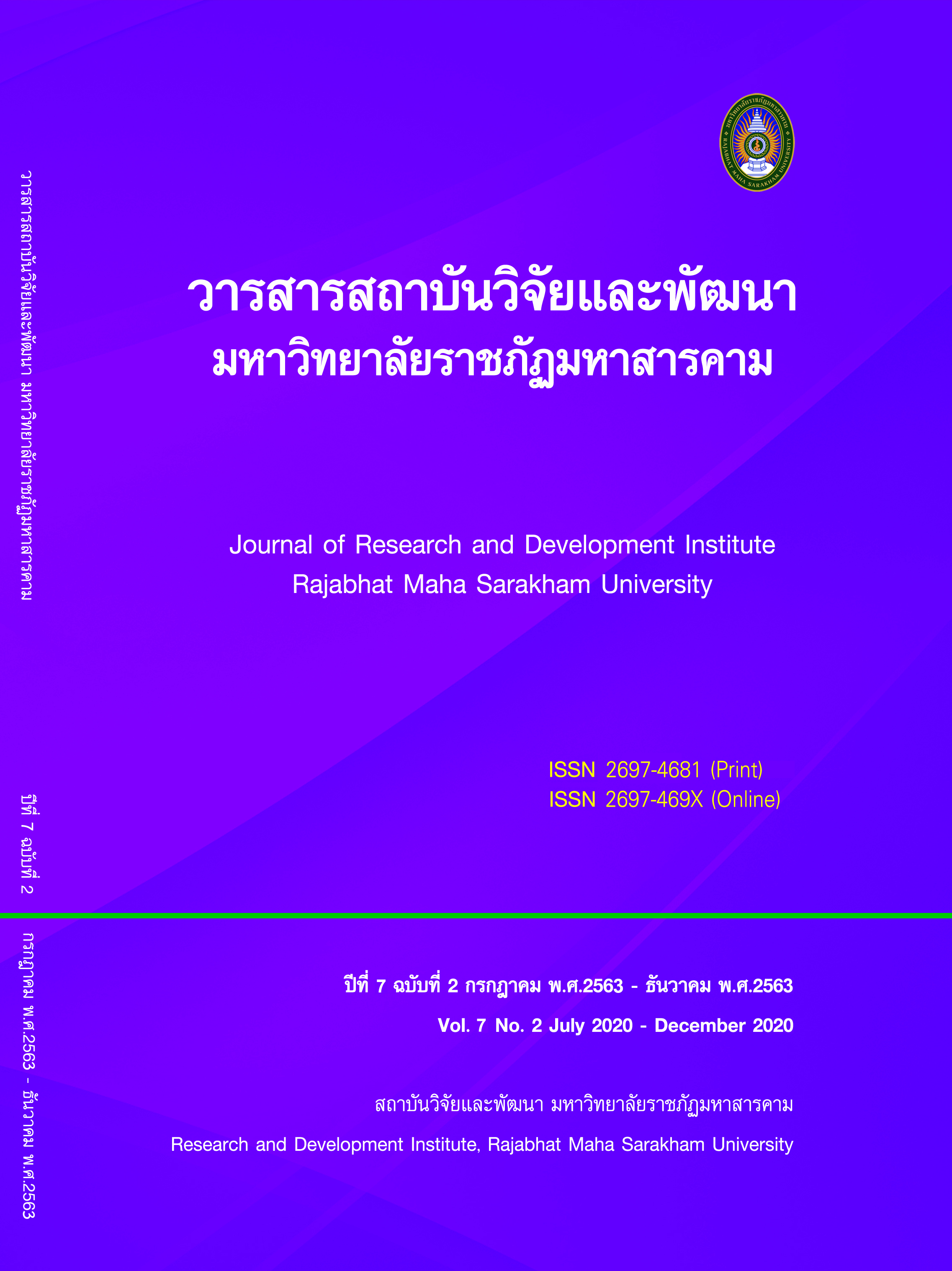Strengthen Leadership Development Program of Innovative Educational Administrators Secondary Educational Service Area Office Area 22
Keywords:
Develop a program to strengthen the creative leadershipAbstract
This study aims to 1) study the current conditions and desirable conditions of a creative leadership of school administrators school administrators in Secondary Educational Service Area Office Area 22, and 2) develop a program to strengthen the creative leadership of school administrators in Secondary Educational Service Area Office Area 22. This research carried out two phases of research: Phase 1, the current conditions and desirable conditions of a creative leadership of s school administrators in Secondary Educational Service Area Office Area 22, and Phase 2, Development of the Programs to Enhance a Creative school administrators in Secondary Educational Service Area Office Area 22. The samples include school administrators / teachers. 338 people, including tools. Survey on Leadership Initiative. A rating scale has five levels ranging is confident the No. 0.87, questionnaires and evaluate the suitability and feasibility. Data were analyzed by percentage, mean, standard deviation.
The results were as follows:
- The current conditions of a creative leadership of school administrators was at a high level in overall. For the desirable condition of a creative leadership of school administrators was at the highest level in overall. The high rated items of the needs for creating creative leadership were Individualized Consideration, creative, vision, flexibility and Teamwork.
- 2. The creative leadership program for school administrators consisted of background and importance, principals, purposes, content, development process and evaluation. All aspects was at the highest level and the possibility is at the highest level.
Keyword: Develop a program to strengthen the creative leadership
References
References
Anan Phannuek. (2011). Research and Development of Program for Developing the Basic School Administrators’ Competency. Doctor of Educational (Educational Administration). Khon kaen: Khon kaen University.
Eisner, E. (1976). “Educational Connoisseurship and Criticism: Their form and Functions in Educational Evaluation”. Journal of Aesthetic Evaluation or Education, 10:135-150.
Jakgree Tonchua. (2012). The Development of a Leadership Enhancement Program for Students' Association Committee of Northeastern Technical Colleges under the Office of the Vocational Education Commission. Doctor of Educational (Leadership Educational Administration). Sakon Nakhon: Sakon Nakhon Rajabhat University.
Jiraporn Amonchai. (2010). The Development of Leadership Program of Local Administrators Under Local Government. Doctor of Education (Educational Administration and Development). Mahasarakham: Mahasarakham University.
Kittikorn Thammakitjawat. (2019). The Development of the Programs to Enhance a Creative Leadership of School Administrators in the Private Education under Buriram Provincial Office. Doctor of Education (Educational Administration and Development). Mahasarakham: MahasarakhamUniversity
Kittkhan Patipana. (2013). A Structure Equation Model of Creative Leadership for Vocational College Administrators. Doctor of Educational (Educational Administration). Khon kaen: Khon kaen University.
Krongthip Nakvichet. (2014). A Model for Leadership Development of Private University Student Leaders. Nakhon Ratchasima: Vongchavalitkul University.
Nethercote, R. (1998). Leadership in Australian University. Colleges and Halls of Residence: A Model for the Future. Unpublished Doctor of Education Thesis, The University of Melbourne, Parkville.
Paitoon Sinlarat. (2010). Creative leaders and productivity: New paradigms and new leaders. Bangkok: Faculty of Education, Chulalongkorn University.
Pongphop PhoojomJit. (2012). The Development of Indicators of Servant Leadership for Basic School Administrators. Doctor of Educational (Education Management). Mahasarakham: Rajabhat Mahasarakham University.
Ruth, A. and Maurice Persall. (2007). The Principal as Chief Learning Officer: The New Work of Formative Leadership. Birmingham: Stamford University Birmingham.
Stogdill, R. M. (1974). Handbook of Leadership. New York: The Free.
Sumet Sangnimnuan. (2009). Leadership and governance in the administration of local government organizations. Bangkok: Sor. Charoen Printing
Supatta Pinthapataya. (2011). Moral and Ethics for Leaders. [Online] http://www.supatta. haysamy.com/learn2_1.html. [18 October 2019].
Suthep Kaengsanthia. (2013). Program Development of Educational Personnel Professional Development to be Leader in Driving Sufficiency Economy in schools Under the Office of Vocational Education Comission. Doctor of Educational (Educational Administration). Burirum: Rajabhat Burirum University.
Suthep PongSriwat. (2007). Leadership. Bangkok: S. Asia Press.
Venerable Phra Dhammapitaka (P.A. Payutto). (2010). Leader. Bangkok: Matichon Publishing House.
Wimol Jankaew. (2012). A creative leadership development model for the school directors of Suratthani primary education service area office 3. Doctor of Education (Educational). Pathumthani: Rungsit University.
Wiroj Sanrattana. (2009). “A proposed conceptual model for knowledge management in educational organization”. Journal of Educational Administration, KKU. 5 (1) : 109-115
Yordanong Jomhongbhibhat. (2010). Development of a program for developing instructional leadership in learning management based on the educational reform of basic education. Doctor of Educational (Leadership Educational Administration). Sakon Nakhon: Sakon Nakhon Rajabhat University.
Downloads
Published
How to Cite
Issue
Section
License
Articles that are published are copyrighted by the authors of the articles







